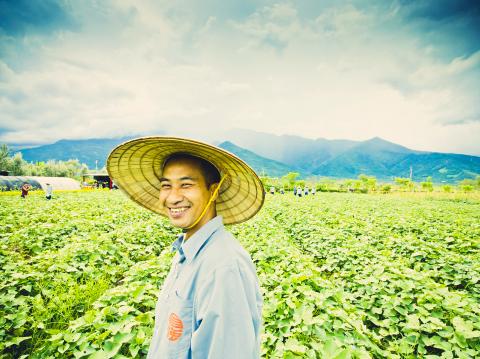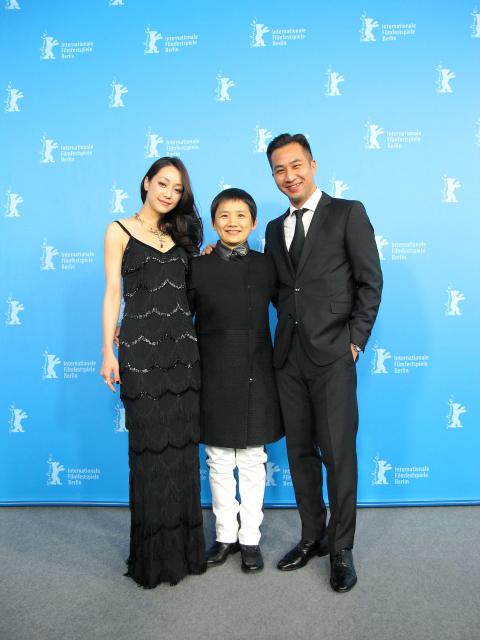Occupying a small corner of the recently refurbished Martin Gropius Bau art gallery in central Berlin, also the temporary headquarters for the city’s 64th Berlin film festival, a team of Taiwanese film industry heavy-weights and sales agents were busily engaging a stream of visitors.
The nine-strong group had a mission on their hands: to sell the political docu-drama and festival selected-film The Rice Bomber (白米炸彈客) to the world.
“I just hope that audiences in Berlin can see something different about Taiwan,” explained the film’s director Cho Li (卓立).

Photo courtesy of 1 Production Film Co / Ocean Deep Films
The Rice Bomber is certainly different. Based on the life of self-confessed bomb-maker Yang Ju-men (楊儒門) the two-hour film carefully unpicks the events leading up to his politically-motivated 12-month campaign of 2003-2004 during which he planted 17 small bombs, packed with rice, to highlight the hardships faced by struggling Taiwanese farmers.
After Taiwan joined the WTO to much pomp and ceremony in early 2002, Taiwanese farmers were then forced to compete in an increasingly competitive agricultural market. It was from this anxious and uncertain period that Yang emerged and seared his mark on Taiwanese history. While his bombs, the first of which bore the message: “Against rice importing — the government should look after its people,” never killed or injured anyone (in fact only two detonated), he was sentenced to seven-and-a-half years in jail in 2005. He was pardoned in 2007 after spending 16 months in jail.
“The Rice Bomber is the first film about the agricultural industry in Taiwan,” says Cho Li, her tiny frame dwarfed by the palatial and opulent hall of the once war-ravaged Martin Gropius Bau interior.

Photo: Taipei Times
“I am from Changhua, the same city as the rice bomber, and that’s one of the reasons I wanted to make this film. He planted those bombs in 2003-2004, but he had seen farmer’s hardship for more than 20 years by then,” she says.
For lead actor Jag Huang (黃健瑋), who also attended the festival, playing the man who has become part of modern-day Taiwanese folklore had its own challenges, many of them physical.
“Yang had been in an elite unit of the Taiwanese army and so he was strong,” says Huang, “and that meant I had to get into shape for the role … at one point I cycled all the way around Taiwan.”
Huang says he felt sympathy with Yang, whom he met in person, for the task.
“He didn’t use nails or anything, it wasn’t really violent. I think it was more like an announcement to create awareness.”
The film is, at times, a somewhat overly sentimental portrayal of Yang, with music designed to pluck at our heartstrings, and a cast of victimized characters, which robs the film of some of its political punch.
However, it is a brave attempt to tackle a controversial issue and the film cleverly uses newsreel footage and dialogues between Yang and his alter-ego to provide both context and insight. Taiwan also plays a leading role with High Definition film portraying Taipei, Changhua and coastal areas in a beautiful light.
The film ventures into further controversial territory with the portrayal of ‘trouble-maker,’ the young woman who became Yang’s friend and confidante. Despite rumors that ‘trouble-maker,’ played by Nikki Hsieh (謝欣穎), was the daughter of a wealthy and influential family, she espoused revolutionary theories and ideas that, as is shown in the film, she uses to both goad, inspire and dismiss Yang.
For Hsieh the role she played required plenty of personal innovation.
“I was aware that the character was based on someone real — she was tough but attractive and also confident. I had to find that in myself,” she said.
For Hsieh, recently seen in the films Make Up (命運化妝師) and Honey Pupu (消失打看), the film fulfills another role, which is to lift Taiwanese movies into new territory.
“We’ve had a lot of commercial films but this allows Taiwanese to see the problems society is facing.”
Tapping into the realities of Taiwan remain a source of inspiration for the film’s producers Yeh Ju-fen (葉如芬) and Lee Lieh (李烈) who helped steer the kitchen-based comedy Zone Pro Site (總舖師) to commercial success.
“Although Taiwan is a very small country, people there are full of life,” Yeh says, adding, “this is more and more apparent in our movies. Though Taiwanese film-makers may be young, they are creatively vibrant and that’s why the Taiwanese film industry is booming.”
After Yang received a presidential pardon in June 2007, he has turned his attention to promoting organic farming and locally-based farmers’ markets.
Actor Huang, having just watched the premiere in Berlin explained: “I was nervous about it all, but now I think I can see Yang again and say, ‘it was an accurate portrayal — I didn’t let you down.’”

Taiwan has next to no political engagement in Myanmar, either with the ruling military junta nor the dozens of armed groups who’ve in the last five years taken over around two-thirds of the nation’s territory in a sprawling, patchwork civil war. But early last month, the leader of one relatively minor Burmese revolutionary faction, General Nerdah Bomya, who is also an alleged war criminal, made a low key visit to Taipei, where he met with a member of President William Lai’s (賴清德) staff, a retired Taiwanese military official and several academics. “I feel like Taiwan is a good example of

March 2 to March 8 Gunfire rang out along the shore of the frontline island of Lieyu (烈嶼) on a foggy afternoon on March 7, 1987. By the time it was over, about 20 unarmed Vietnamese refugees — men, women, elderly and children — were dead. They were hastily buried, followed by decades of silence. Months later, opposition politicians and journalists tried to uncover what had happened, but conflicting accounts only deepened the confusion. One version suggested that government troops had mistakenly killed their own operatives attempting to return home from Vietnam. The military maintained that the

Before the last section of the round-the-island railway was electrified, one old blue train still chugged back and forth between Pingtung County’s Fangliao (枋寮) and Taitung (台東) stations once a day. It was so slow, was so hot (it had no air conditioning) and covered such a short distance, that the low fare still failed to attract many riders. This relic of the past was finally retired when the South Link Line was fully electrified on Dec. 23, 2020. A wave of nostalgia surrounded the termination of the Ordinary Train service, as these train carriages had been in use for decades

Lori Sepich smoked for years and sometimes skipped taking her blood pressure medicine. But she never thought she’d have a heart attack. The possibility “just wasn’t registering with me,” said the 64-year-old from Memphis, Tennessee, who suffered two of them 13 years apart. She’s far from alone. More than 60 million women in the US live with cardiovascular disease, which includes heart disease as well as stroke, heart failure and atrial fibrillation. And despite the myth that heart attacks mostly strike men, women are vulnerable too. Overall in the US, 1 in 5 women dies of cardiovascular disease each year, 37,000 of them